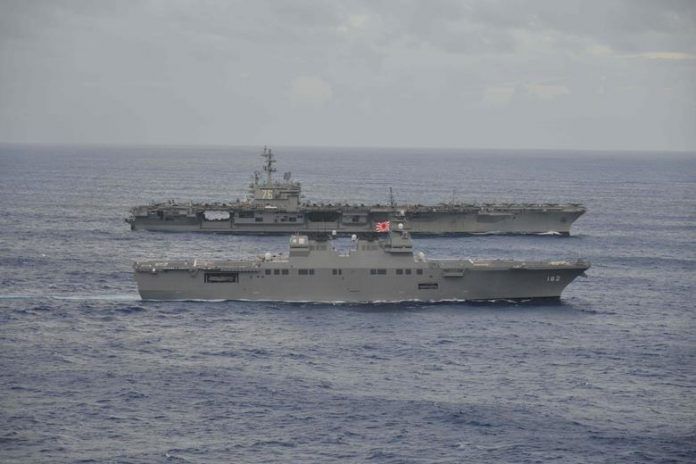
By Linda Sieg and Kiyoshi Takenaka
TOKYO, July 18 (Reuters) – Japanese Prime Minister Shinzo Abe faces a tough diplomatic challenge from an expected U.S. request to send its navy to join a military coalition to safeguard strategic waters off Iran and Yemen.
Japanese officials will attend a briefing in Washington on the proposal, a government spokesman said on Thursday, and it could be on the agenda when U.S. national security adviser John Bolton visits Tokyo next week, domestic media said.
A decision to join such a coalition would likely inflame a divide in Japanese public opinion over sending troops abroad. Japan’s military has not fought overseas since World War Two.
Abe’s coalition is expected to win a solid majority in an upper house election on Sunday but ruling bloc lawmakers have avoided discussing the possible maritime mission during the campaign.
“Until the election is over, they can’t touch such a touchy subject”, said a source familiar with the government’s stance.
Below is an explanation of why this issue is contentious and what Japan’s options are.
JAPAN’S STAKE IN THE REGION
Japan is the world’s fourth-biggest oil buyer and 86% of its oil supplies last year passed through the Strait of Hormuz, a vital shipping route linking Middle East oil producers to markets in Asia, Europe, North America and beyond.
Last month, a tanker operated by a Japanese shipping company was attacked in the Gulf of Oman and the United States blamed Iran. Tehran denied the allegation.
Abe is also keen to maintain and strengthen the U.S.-Japan security alliance, the pillar of its defence policies.
U.S. President Donald Trump has criticised the pact as unfair and rejecting a U.S. request to join a maritime coalition could exacerbate that dissatisfaction.
“Japan has to do something to protect our own vessels,” said a former Japanese senior diplomat. “We cannot keep asking others to do it.”
Japan, however, also has friendly ties with Iran and might be reluctant to damage those ties by joining a military mission, especially when Trump’s critics blame him for escalating tensions. Abe made an unsuccessful bid to ease tensions in the region when he met Iranian leaders in Tehran last month.
[aesop_image img=”https://kayhanlife.com/wp-content/uploads/2019/07/RTR4EYSJ-1024×644.jpg” panorama=”off” credit=”REUTERS/Mass Communication Specialist 3rd Class Chris Cavagnaro/U.S. Navy/Handout” align=”center” lightbox=”off” captionsrc=”custom” caption=”U.S. Navy and Japan Maritime Self-Defense Force ships steam in formation during their military manoeuvre exercise known as Keen Sword 15 in the sea south of Japan. ” captionposition=”center” revealfx=”off” overlay_revealfx=”off”]
WHY IS THIS POLITICALLY CONTENTIOUS?
Japan in 2015 enacted legislation that could let its troops fight overseas for the first time since its defeat in World War Two, a milestone in Abe’s push to loosen the limits of the pacifist constitution on the military.
The legislation allows Japan to go to the defence of a friendly country under attack if it constitutes an “existential threat” to Japan. If the government decides the situation could lead to an armed attack on Japan, it can offer logistical support to multi-national forces.
Enactment of the laws, which Abe said were needed to meet new security challenges, triggered huge protests from opponents who said it violated the constitution and could ensnare Japan in U.S.-led conflicts. A move to send the navy to take part in a U.S.-led operation would almost certainly revive that debate.
JAPAN’S OPTIONS
Experts have pointed to four legal frameworks that could be used to justify a decision to send Japanese warships and planes to join the maritime mission.
The most likely option, they said, would be for Japan to take part based on an existing Anti-Piracy Law for anti-piracy and escort missions, as long as attackers are considered non-state actors. Japan currently takes part in a multilateral mission off the coast of Somalia and in the Gulf of Aden.
Or Japan could exercise its right of collective self-defence, or aiding an ally under attack, based on the 2015 laws, but the legal hurdle is higher.
The defence minister could dispatch naval vessels or planes as a maritime security operation to protect Japanese ships and goods bound for Japan. In principle, other countries’ vessels would not be protected.
Japan could also enact special, one-off legislation, but that would be a time-consuming process.
(Reporting by Linda Sieg; Editing by Nick Macfie)

